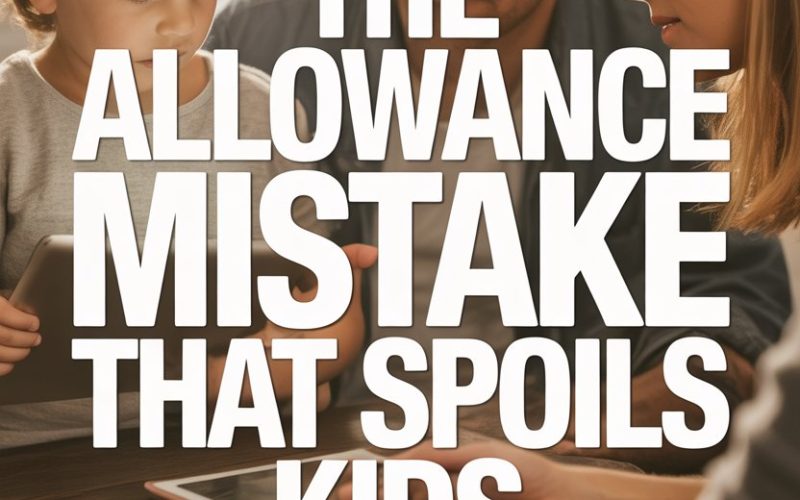Handing over a crisp fiver to your child’s palm can feel like a parenting win. They’re beaming, you’re encouraging independence, and maybe—just maybe—they’ll stop nagging for Robux (for five whole minutes).
But there’s a trap lurking in the world of pocket money, and it snags even the most well-intentioned mums and dads.
This isn’t about amounts or the classic “chores vs. no chores” debate.
There’s one sneaky allowance mistake that quietly breeds entitlement, drains motivation, and leaves you wondering if you’re raising a future contestant on a reality show about adults who can’t boil an egg.
Let’s get to the heart of it. And don’t worry—no guilt trips, just a little tough love laced with hope (and maybe a side of biscuits).
The Perils of the No-Strings-Attached Allowance
There’s something comforting about a regular allowance, isn’t there? A standing order of coins, like clockwork.
The problem lies in the autopilot approach: money lands in your child’s hand every week, no questions asked, no expectations, no effort.
Imagine your boss popping your salary in the bank for simply existing. Tempting, until you realise how little you’d actually do for eight hours a day.
Research from the University of Cambridge on money habits shows that lifelong financial attitudes form early, and treating allowance as a guaranteed right—rather than a privilege or a tool—teaches kids exactly the wrong lesson.
You’d be surprised how quickly “allowance day” starts to feel less like a meaningful gift and more like a birthright.
Entitlement: The Uninvited House Guest
Kids are brilliant at adapting to routines. When regular allowance rolls in with zero discussion, it’s easy for them to expect it, not appreciate it.
That’s how entitlement sneaks in—on silent socks. It’s the silent shift from “thank you!” to “where’s my money?” (Often accompanied by an expertly raised eyebrow.)
Psychologist Dr. Laura Markham, founder of Aha! Parenting, notes that when children don’t link pocket money to any kind of participation or reflection, they can start believing it’s simply owed to them.
And when such beliefs are cemented, gratitude takes a backseat—right next to motivation.
The Motivation Meltdown
The old “money for nothing” model is brilliant—if you’re training for a life of waiting for windfalls. The key mistake here? Missing the opportunity to use allowance as a motivator for learning, doing, or contributing.
A study published in the Journal of Economic Psychology found that children who receive unconditional pocket money are less likely to value effort, delay gratification, or develop budgeting skills.
Basically, it’s like giving someone a gym membership but banning them from touching the equipment.
Allowance should be more than just a payout—it should be a hands-on lesson in earning, saving, and spending.
Chores: Not the Enemy (But Not the Whole Story)
You’ve probably heard the classic debate: should allowance be tied to chores? Experts are split.
Some worry that linking money to basic family contributions turns every request into a negotiation (and do you really want to end up paying £3 every time someone wipes down the kitchen counter?).
The sweet spot? Many parenting pros recommend a hybrid approach. Offer a base allowance for being part of the family—think of it as training wheels for managing money.
But layer in opportunities to earn extra by taking on bigger jobs, like mowing the lawn or washing the car. This gives kids a taste of both responsibility and agency, without treating family life like a never-ending gig economy.
Australian parenting expert Maggie Dent describes this as “teaching the difference between pulling your weight as a team member and hustling to earn extra.”
The message: some things you do because you’re family, some things you can do to earn.
The Teachable Moment Hiding in Plain Sight
Money isn’t just numbers on a screen—or coins buried in the sofa. When kids know exactly how, why, and when they receive money, each allowance moment doubles as a financial education session (disguised as pocket money day).
Use allowance time to chat through choices: saving for that big Lego set, giving to a charity, or blowing it all on gummy snakes. Encourage decisions, mistakes, and even the odd regret.
Turns out, blowing an entire week’s money on fidget spinners is a powerful lesson in buyer’s remorse—one that’s much harder to forget than any lecture.
Researchers at the University of Michigan have found that children who actively discuss money with their parents build stronger financial literacy skills, and are more confident managing their own money as adults.
Allowance Should Grow With Your Child
Kids are not static; their needs and abilities change faster than you can say “growth spurt.” That means allowance shouldn’t be forever set in stone, either.
As children get older, let them take on more responsibility for their spending. Maybe your ten-year-old gets pocket money only for treats, but by thirteen, they’re budgeting for outings with mates or the odd gift for a friend.
Review the allowance system regularly, adjusting expectations and amounts as new challenges and opportunities pop up.
Just remember: when allowance is disconnected from effort, need, or discussion, it stops being a teaching tool and becomes more like…well, free money from the Bank of Mum and Dad.
Involve Kids in the Process
Handing over money with zero context is a lost opportunity.
Try setting up a regular family chat—not a PowerPoint presentation, just five minutes over tea—where kids can share what they’ve spent, saved, or wish they’d done differently.
Apps like RoosterMoney or GoHenry make this even easier, letting children track their earnings, set goals, and even donate to charity from their own device.
Think of it as piggy banking for the 21st century, minus the need for a sledgehammer to open it.
The bonus? These chats often spark conversations about values, delayed gratification, and why the dog’s vet bill is more than a month’s worth of pocket money.
Mistakes Parents Make (Besides Just Handing Over Cash)
- Using allowance as a bribe or punishment. Withholding pocket money for bad grades or bad behaviour can backfire. The goal is to build money sense, not to make your child dread talking about finances.
- Forgetting to model good habits. Kids spot hypocrisy at fifty paces. If you’re hiding shopping bags or dodging bill talk, children notice. Show them how you save, spend, and sometimes make mistakes.
- Ignoring the power of “no.” It’s okay to say no when the latest must-have toy is your child’s third in a fortnight. Denial teaches boundaries (and stretches both allowance and patience).
What If You’ve Made the Allowance Mistake Already?
Take heart, you’re in good company. Many parents fumble the allowance ball at some point.
The good news? Kids are remarkably resilient, and habits can shift with just a tweak or two.
Try these tonight:
- Chat with your child about the purpose of pocket money. Ask what they think it’s for, and share what you hope they’ll learn.
- Brainstorm together: what jobs around the house could count for extra earning? What spending decisions are they ready to manage alone?
- Pick one new habit to start next allowance day—like discussing one “money mistake” and what they learned.
Tiny tweaks now prevent much bigger headaches later (and shouldn’t require you to take out a second mortgage on your patience).
Raising Kids Who Respect Money—and Themselves
Allowance isn’t just about spending or saving. It’s a chance to learn generosity, patience, and problem-solving.
When pocket money is earned, discussed, and treated as a tool—not an entitlement—kids build more than just a savings account. They build confidence, gratitude, and an appreciation for effort.
So the next time allowance day rolls around, skip the autopilot payout.
Instead, have a chat, set expectations, and let your child stretch their financial wings—awkwardly, sometimes, but always with heart.
Your future adult will thank you. Maybe even with a cup of tea. If you’re lucky.




